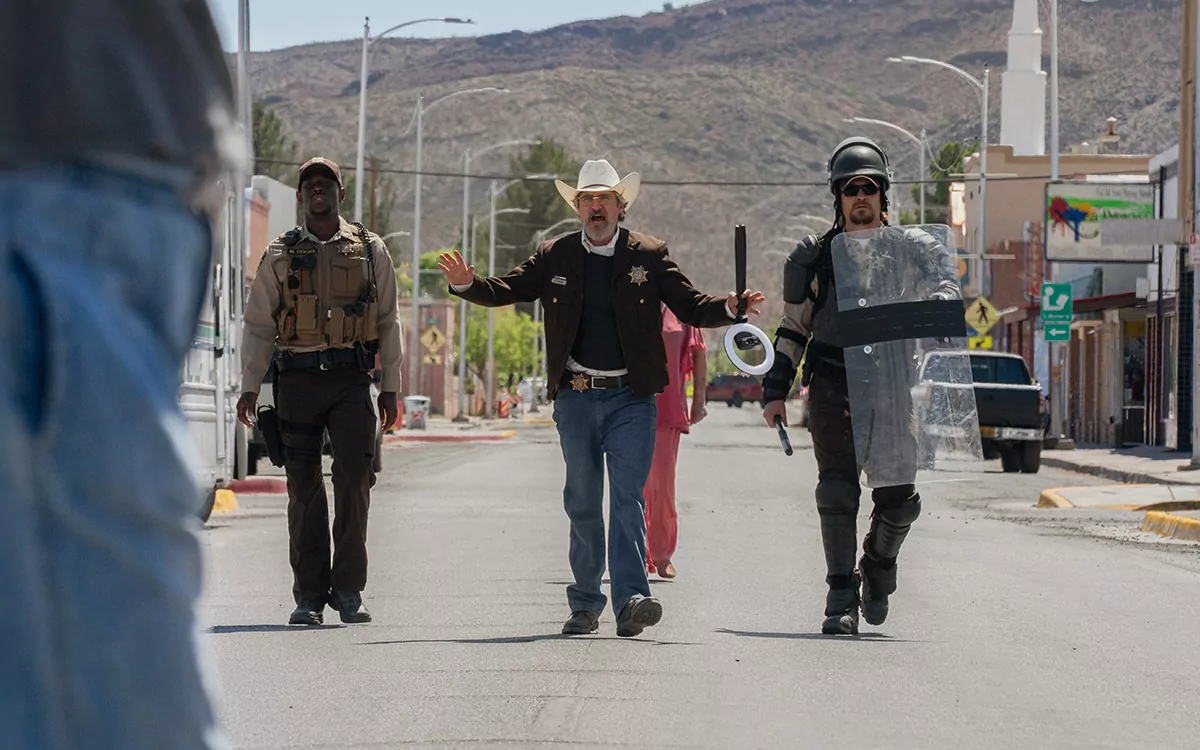Ari Aster’s Eddington opens with a sweaty, crazy man ranting and raving, and you have to give it this much: rarely has a movie so accurately conveyed its entire vibe from frame one. The time is late May, 2020, deep in the darkness of COVID lockdown; the place is the small town of Eddington, New Mexico; the protagonist is the town’s sheriff, Joe Cross (Joaquin Phoenix), who tells us all we need to know when he’s offered a mask by the nearest town’s police and waves it off with a “No, I’m good.”
I’ve spent much of the past five years complaining about the ways in which, with a few noteworthy exceptions (mostly small indies like Stress Positions and Sharp Stick), moviemakers chose to ignore the pandemic entirely. The most typical excuse — that it was a traumatic event, and moviegoers wanted to escape it rather than see reminders of it — certainly won’t be refuted by Eddington, which deftly captures the mix of dread, paranoia, and claustrophobia that permeated the national character at that specific moment. And whatever my issues with the result (and we’ll get to those presently), writer/director Aster aptly captures how that whole summer felt like a slow fuse burning, between the lockdowns, the friction over them, the George Floyd murder, and its subsequent protests.
His central conceit, of using this one small town as a microcosm for all of America, is a good one, and not only from a conceptual standpoint; it’s a fine illustration of how, in that moment of simultaneous physical isolation and digital connection, everything seemed to be happening everywhere. (It’s one of the few films I’ve seen that accurately dramatizes how much of our lives we spend on our phones.) Phoenix’s Sheriff Cross represents the MAGA blowhards, refusing to mask up (he blames his asthma), railing about the fake pandemic, regurgitating talking points he’s picked up, mostly by osmosis, from his conspiracy theorist live-in mother-in-law (Deirdre O’Connell), who says things like “I encouraged her to do her own research.”
We’ve gone far enough into the abyss that it’s worth recalling the loaded political implications of simple consideration, and that’s the perspective represented by Ted Garcia (Pedro Pascal), Eddington’s mayor, currently running for re-election. He and Cross clash over masking and lockdowns, but they have their own peculiar personal history as well, and that conflict fuels Cross to announce his own candidacy for mayor — in, of course, a Facebook video shot on his phone from the driver’s seat of his pick-up truck. (His improvised slogan, “We need to free each other’s hearts,” is exactly the kind of nonsense you expect to hear in a front-seat video.) Soon that truck is covered in a mixture of campaign signage and anti-lockdown rhetoric; the sign reading “YOUR BEING MANIPULATED” is an obvious touch, but what the hell, it works.
Of course, Ted Garcia isn’t a “good guy,” because there are no good guys in Aster’s world, and it is sort of admirable (and uncommercial) for him to refuse to present a single fully sympathetic character to lock in with. But there’s also something wildly disingenuous about his screenplay’s bothsides-ism; try as he might, Aster can’t quite manage to correlate the sins of Garcia and the other left/liberal characters (performative social protest, ideological inconsistency) with the institutional racism, police corruption, and worse of Cross and his ilk — especially after the dark turn the story takes around the 90-minute mark.
Pascal doesn’t have much of a character to play, but his inherent charisma is so strong that you barely notice. Emma Stone isn’t so lucky; the writing is so thin, and her character so plain Jane dull, that this force-of-nature barely makes an impression. Phoenix, however, is doing some of his best recent work here, using all of his tools to convey, in scene after scene, what and how his character is thinking (and, more often than not, flailing). He has a lot of good moments, but the best of them is the way he snaps “Just don’t make me think. Post it!” after recording a particularly ill-advised rant at a poorly-attended campaign event. Austin Butler appears too briefly as a Qanon-ish influencer type, but he’s got this guy down cold.
But the longer Eddington goes (and boy, it goes and goes, clocking in at two-and-a-half hours but feeling much longer), the more its false equivalencies and narrative aimlessness do it in. The anti-liberal material feels strained because it’s just so toothless, and Aster ultimately has to abandon reality entirely and surrender to right-wing fantasy bullshit in order to construct an ending that feels “balanced.” (Said ending, as is becoming an unfortunate habit with his work, is also endless.)
Eddington can’t be discounted, because it feels so specific and accurate about the way people think, talk, and live, then and ever since. It’s ugly and upsetting, and so is everything around us, so there’s something to be said for the mere attempt to wrap all of that together into a feel-bad package. But by the picture’s end, as Phoenix is running around town with a machine gun in an extended sequence whose very relationship to reality is frustratingly unclear, it’s obvious that Aster has basically given up, and I was inclined to do the same. It’s hard to recall a picture that I’ve simultaneously admired and loathed, in such equal proportion.
C
“Eddington” is in theaters Friday.
